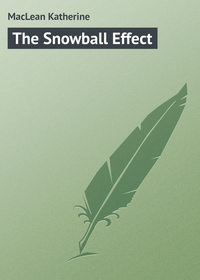Kitobni o'qish: «The Snowball Effect»
Tack power drives on a sewing circle and you can needle the world into the darndest mess!
"All right," I said, "what is sociology good for?"
Wilton Caswell, Ph.D., was head of my Sociology Department, and right then he was mad enough to chew nails. On the office wall behind him were three or four framed documents in Latin that were supposed to be signs of great learning, but I didn't care at that moment if he papered the walls with his degrees. I had been appointed dean and president to see to it that the university made money. I had a job to do, and I meant to do it.
He bit off each word with great restraint: "Sociology is the study of social institutions, Mr. Halloway."
I tried to make him understand my position. "Look, it's the big-money men who are supposed to be contributing to the support of this college. To them, sociology sounds like socialism – nothing can sound worse than that – and an institution is where they put Aunt Maggy when she began collecting Wheaties in a stamp album. We can't appeal to them that way. Come on now." I smiled condescendingly, knowing it would irritate him. "What are you doing that's worth anything?"
He glared at me, his white hair bristling and his nostrils dilated like a war horse about to whinny. I can say one thing for them – these scientists and professors always keep themselves well under control. He had a book in his hand and I was expecting him to throw it, but he spoke instead:
"This department's analysis of institutional accretion, by the use of open system mathematics, has been recognized as an outstanding and valuable contribution to – "
The words were impressive, whatever they meant, but this still didn't sound like anything that would pull in money. I interrupted, "Valuable in what way?"
He sat down on the edge of his desk thoughtfully, apparently recovering from the shock of being asked to produce something solid for his position, and ran his eyes over the titles of the books that lined his office walls.
"Well, sociology has been valuable to business in initiating worker efficiency and group motivation studies, which they now use in management decisions. And, of course, since the depression, Washington has been using sociological studies of employment, labor and standards of living as a basis for its general policies of – "
I stopped him with both raised hands. "Please, Professor Caswell! That would hardly be a recommendation. Washington, the New Deal and the present Administration are somewhat touchy subjects to the men I have to deal with. They consider its value debatable, if you know what I mean. If they got the idea that sociology professors are giving advice and guidance – No, we have to stick to brass tacks and leave Washington out of this. What, specifically, has the work of this specific department done that would make it as worthy to receive money as – say, a heart disease research fund?"
He began to tap the corner of his book absently on the desk, watching me. "Fundamental research doesn't show immediate effects, Mr. Halloway, but its value is recognized."
I smiled and took out my pipe. "All right, tell me about it. Maybe I'll recognize its value."
Prof. Caswell smiled back tightly. He knew his department was at stake. The other departments were popular with donors and pulled in gift money by scholarships and fellowships, and supported their professors and graduate students by research contracts with the government and industry. Caswell had to show a way to make his own department popular – or else. I couldn't fire him directly, of course, but there are ways of doing it indirectly.
He laid down his book and ran a hand over his ruffled hair. "Institutions – organizations, that is – " his voice became more resonant; like most professors, when he had to explain something he instinctively slipped into his platform lecture mannerisms, and began to deliver an essay – "have certain tendencies built into the way they happen to have been organized, which cause them to expand or contract without reference to the needs they were founded to serve."
He was becoming flushed with the pleasure of explaining his subject. "All through the ages, it has been a matter of wonder and dismay to men that a simple organization – such as a church to worship in, or a delegation of weapons to a warrior class merely for defense against an outside enemy – will either grow insensately and extend its control until it is a tyranny over their whole lives, or, like other organizations set up to serve a vital need, will tend to repeatedly dwindle and vanish, and have to be painfully rebuilt.
"The reason can be traced to little quirks in the way they were organized, a matter of positive and negative power feedbacks. Such simple questions as, 'Is there a way a holder of authority in this organization can use the power available to him to increase his power?' provide the key. But it still could not be handled until the complex questions of interacting motives and long-range accumulations of minor effects could somehow be simplified and formulated. In working on the problem, I found that the mathematics of open system, as introduced to biology by Ludwig von Bertalanffy and George Kreezer, could be used as a base that would enable me to develop a specifically social mathematics, expressing the human factors of intermeshing authority and motives in simple formulas.
